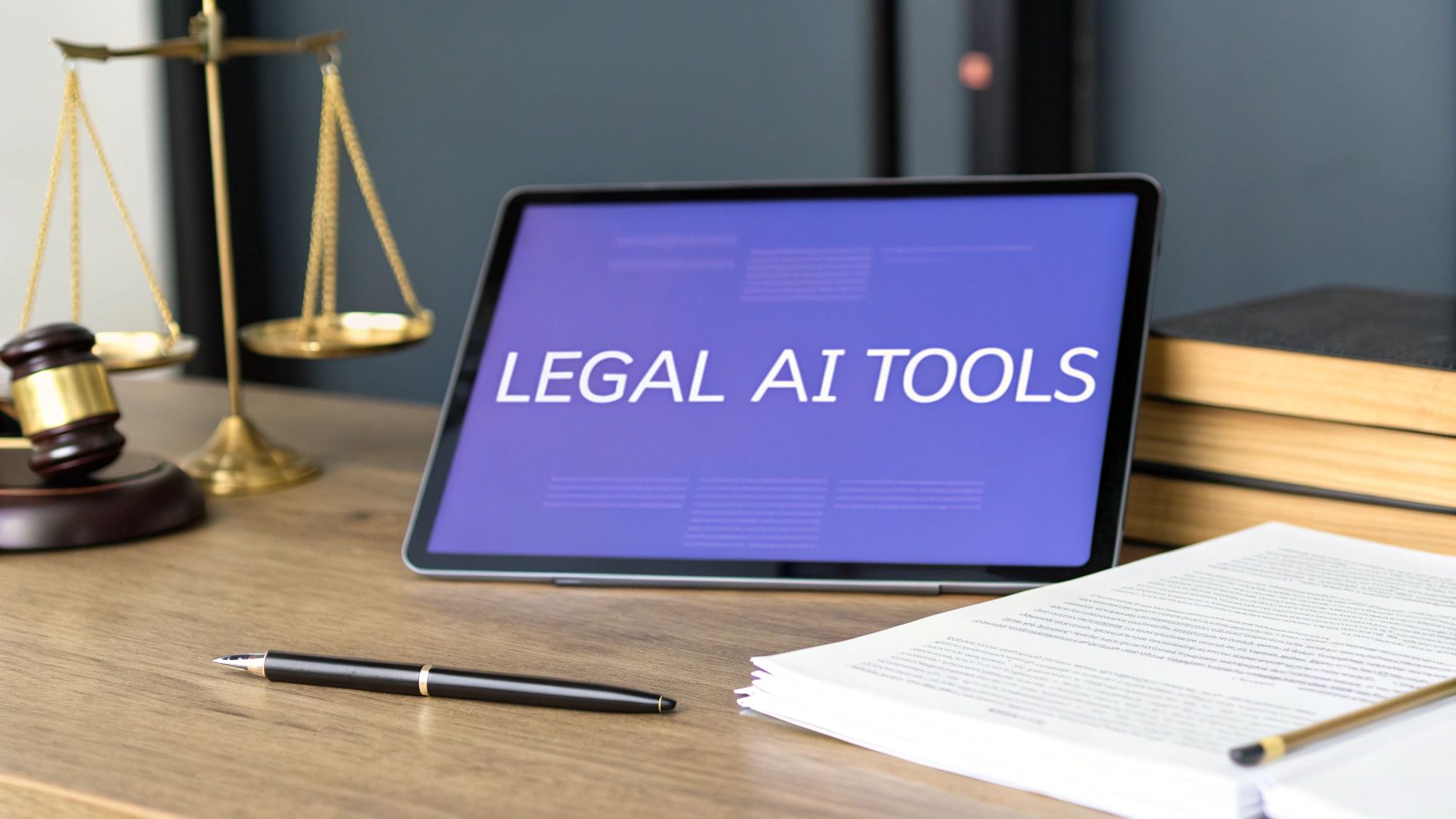
Unlocking Efficiency: The Power of AI in Legal Documents
Legal documents can be complex and costly to manage. This listicle presents eight AI-powered tools for legal documents, helping businesses, legal teams, and individuals find greater efficiency. Discover how these tools use AI for legal documents to simplify analysis, automate reviews, and streamline workflows. From contract review to legal research, these 2025 tools offer solutions for faster, more cost-effective legal processes. Explore the top 8 AI-powered tools below.
1. Legal Document Simplifier
Navigating the complexities of legal documents can be a daunting and expensive task, especially for small businesses, freelancers, and individuals. Legal Document Simplifier leverages the power of AI for legal documents to provide a streamlined, affordable, and efficient solution. This platform transforms dense legal jargon into easily understandable summaries, extracting key terms, deadlines, financial obligations, and potential risks within minutes. This eliminates the need to wade through pages of legalese or incur costly legal consultations for routine document reviews. Imagine quickly grasping the core components of a contract, lease, or NDA without a law degree – that's the value proposition of Legal Document Simplifier. This makes it an invaluable tool for anyone seeking to understand and manage their legal obligations effectively.
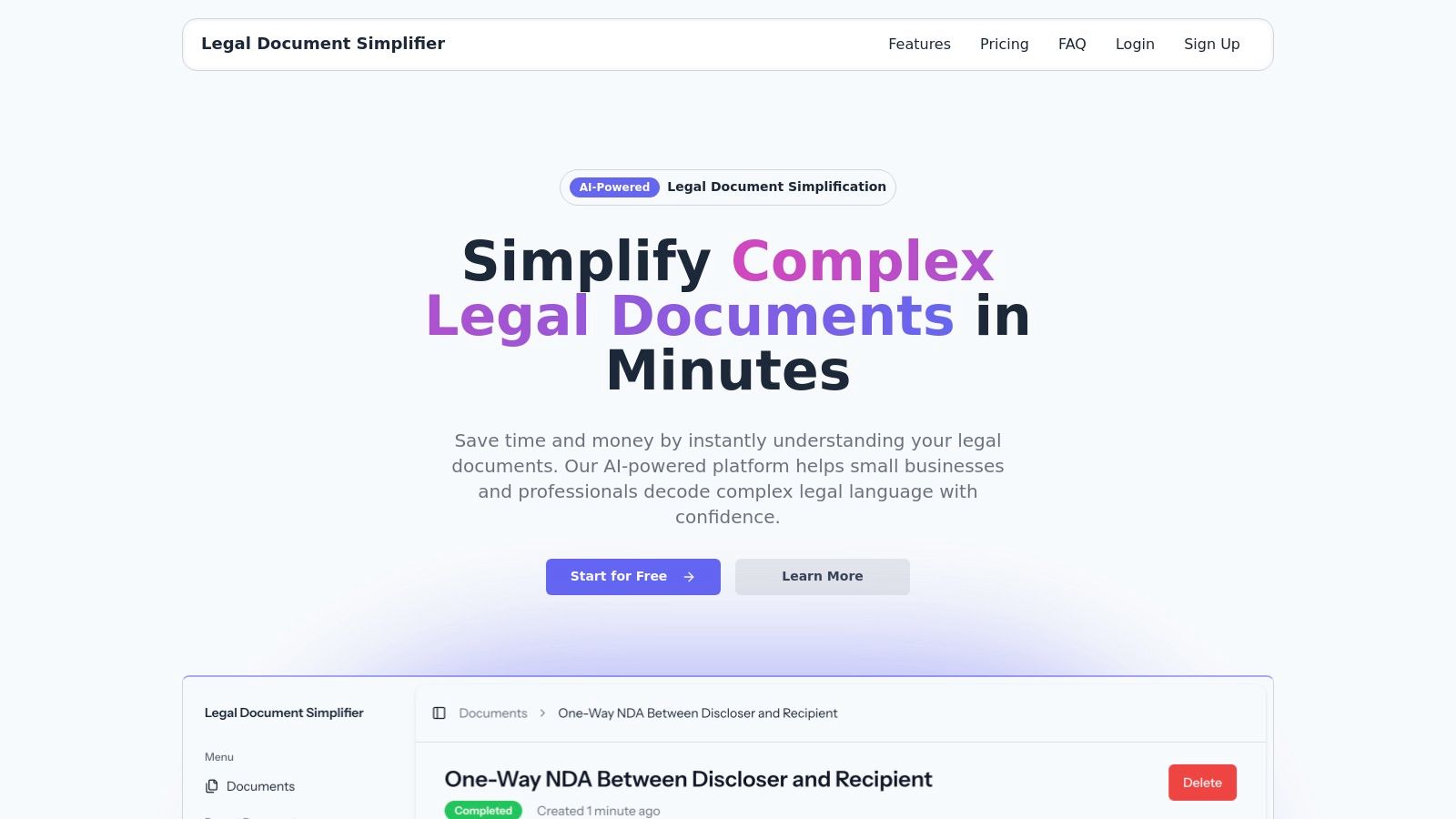
Specifically designed for small businesses, freelance professionals, in-house legal teams, and individual users, Legal Document Simplifier supports common legal document formats, including contracts, leases, and NDAs. The platform's core strength lies in its ability to deliver instant plain-language breakdowns, highlighting critical clauses, important dates, and monetary commitments. This allows users to quickly identify key provisions, potential risks, and crucial deadlines, ensuring compliance and mitigating potential legal issues. Its automated deadline tracking and risk alert features add another layer of protection, ensuring you never miss a critical date or overlook a potentially problematic clause. For comparing different versions of a document, the side-by-side comparison feature quickly highlights changes, saving valuable time and minimizing the risk of overlooking important modifications.
The flexible pricing structure of Legal Document Simplifier caters to diverse needs and budgets. A pay-as-you-go plan at $5 per document (with the first 3 documents free) offers an excellent entry point for occasional users. For more frequent usage, the Pro subscription at $29/month includes 50 simplifications. Larger organizations with high-volume document processing needs can benefit from the customizable Enterprise plan. This tiered pricing model allows users to choose the plan that best aligns with their document volume and budget.
Pros:
- Instant plain-language summaries that save hours of legal review time
- Automated detection of key terms, deadlines, financial obligations, and risk alerts
- Flexible and affordable pricing plans, including a pay-as-you-go option
- Side-by-side document comparison to quickly identify changes between versions
- Secure and private platform ensuring confidentiality of sensitive information
Cons:
- AI analysis may not fully replace expert legal advice for highly complex or specialized cases
- Pro plan limit of 50 included simplifications per month may require additional payments for higher usage
Website: https://legaldocumentsimplifier.com
Legal Document Simplifier deserves its place on this list because it effectively democratizes access to legal document understanding. By leveraging AI, it empowers individuals and businesses to confidently manage their legal obligations without the expense and time commitment associated with traditional legal review processes. While it is not a substitute for professional legal counsel in complex scenarios, it serves as an invaluable tool for simplifying legal workflows and improving comprehension of essential contractual elements. For those seeking a quick, cost-effective, and efficient way to navigate the world of legal documents, Legal Document Simplifier is a powerful ally.
2. ROSS Intelligence
ROSS Intelligence stands out as a powerful AI tool for legal documents, revolutionizing how legal professionals conduct research and analysis. It leverages natural language processing (NLP) to understand complex legal questions posed in plain English, returning precise answers and relevant case law instead of just a list of keywords. This contextual understanding is a game-changer, allowing lawyers to quickly grasp the nuances of legal precedents and statutes. Imagine being able to ask, "What are the legal implications of using copyrighted music in a YouTube video?" and receiving a concise answer backed by relevant case law, rather than sifting through countless search results. This is the power of AI for legal documents, exemplified by ROSS Intelligence.
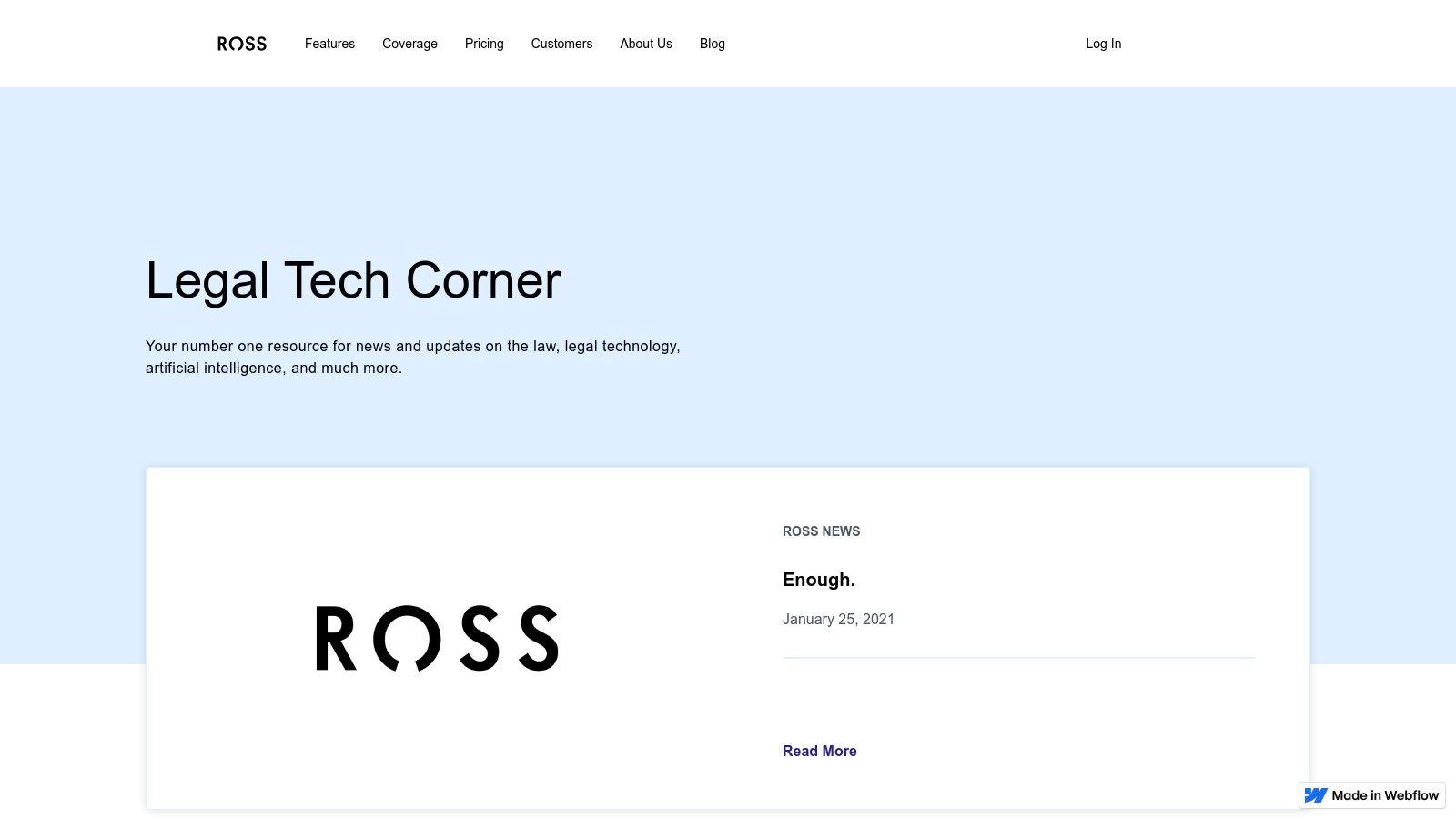
This AI-powered platform dramatically reduces legal research time, a crucial factor for busy professionals, from solo practitioners to in-house legal teams. Its automated document analysis capabilities can sift through thousands of pages in minutes, extracting key information and highlighting relevant precedents that might be missed using traditional search methods. For small business owners negotiating contracts, freelance professionals reviewing service agreements, or startup founders needing quick legal insights, ROSS Intelligence can be a valuable asset. This efficiency translates directly into cost savings and allows legal professionals to focus on higher-level tasks like strategy and client interaction.
Key features include natural language legal search, automated document analysis, case law and statute recommendations, interactive case exploration, and real-time legal updates. The interactive case exploration feature allows users to delve deeper into the context and reasoning behind specific cases, furthering their understanding of the legal landscape. Real-time updates ensure that the information provided is always current, crucial in the ever-evolving legal field.
While ROSS Intelligence offers significant advantages, it’s important to consider the potential drawbacks. The subscription cost can be prohibitive for smaller firms or individual practitioners. There may also be a learning curve for attorneys unfamiliar with AI-powered legal tools. Finally, coverage in some niche practice areas might be limited compared to more comprehensive, traditional legal databases. However, for many legal professionals, the benefits of faster, more accurate research and analysis outweigh these limitations.
Practical Applications and Use Cases:
- Contract Review: Quickly analyze contracts for potential risks and clauses, ensuring compliance and protecting your interests.
- Legal Research: Find relevant case law and statutes efficiently, reducing research time and improving accuracy.
- Due Diligence: Analyze large volumes of legal documents during mergers and acquisitions or other transactions.
- Case Strategy: Identify relevant precedents and legal arguments to build a stronger case strategy.
Comparison with Similar Tools: While other AI legal research tools exist, ROSS Intelligence differentiates itself through its intuitive natural language interface and focus on contextual understanding. Some competitors may offer broader database coverage, but ROSS Intelligence’s strength lies in its ability to quickly pinpoint the most relevant information.
(Pricing and technical requirements information is unavailable at this time. Please visit the ROSS Intelligence website for the most up-to-date details.)
Implementation/Setup Tips: While the platform is designed for ease of use, taking the time to familiarize yourself with the natural language interface and exploring the various features will maximize its effectiveness. Consider attending webinars or online tutorials to accelerate the learning process.
Website: https://www.rossintelligence.com/
ROSS Intelligence earns its place on this list by offering a practical and powerful solution for legal professionals seeking to leverage AI for enhanced efficiency and accuracy in document analysis and research. Its focus on contextual understanding and ease of use makes it a valuable tool for a wide range of legal professionals and organizations, from solo practitioners to large legal departments.
3. Kira Systems
Kira Systems is a leading AI-powered software designed for identifying, extracting, and analyzing critical information within contracts and legal documents. This powerful tool leverages machine learning to automate the often tedious and time-consuming process of contract review. Built specifically for legal contract analysis, Kira can automatically identify and extract hundreds of provisions from contracts, even when the wording varies significantly across different agreements. This makes it an invaluable tool for a variety of users, from small business owners reviewing leases to large legal teams managing complex M&A transactions. Its ability to handle nuances in legal language makes it a powerful addition to any legal tech stack. This positions Kira Systems as a strong contender for anyone looking to leverage the power of AI for legal documents.
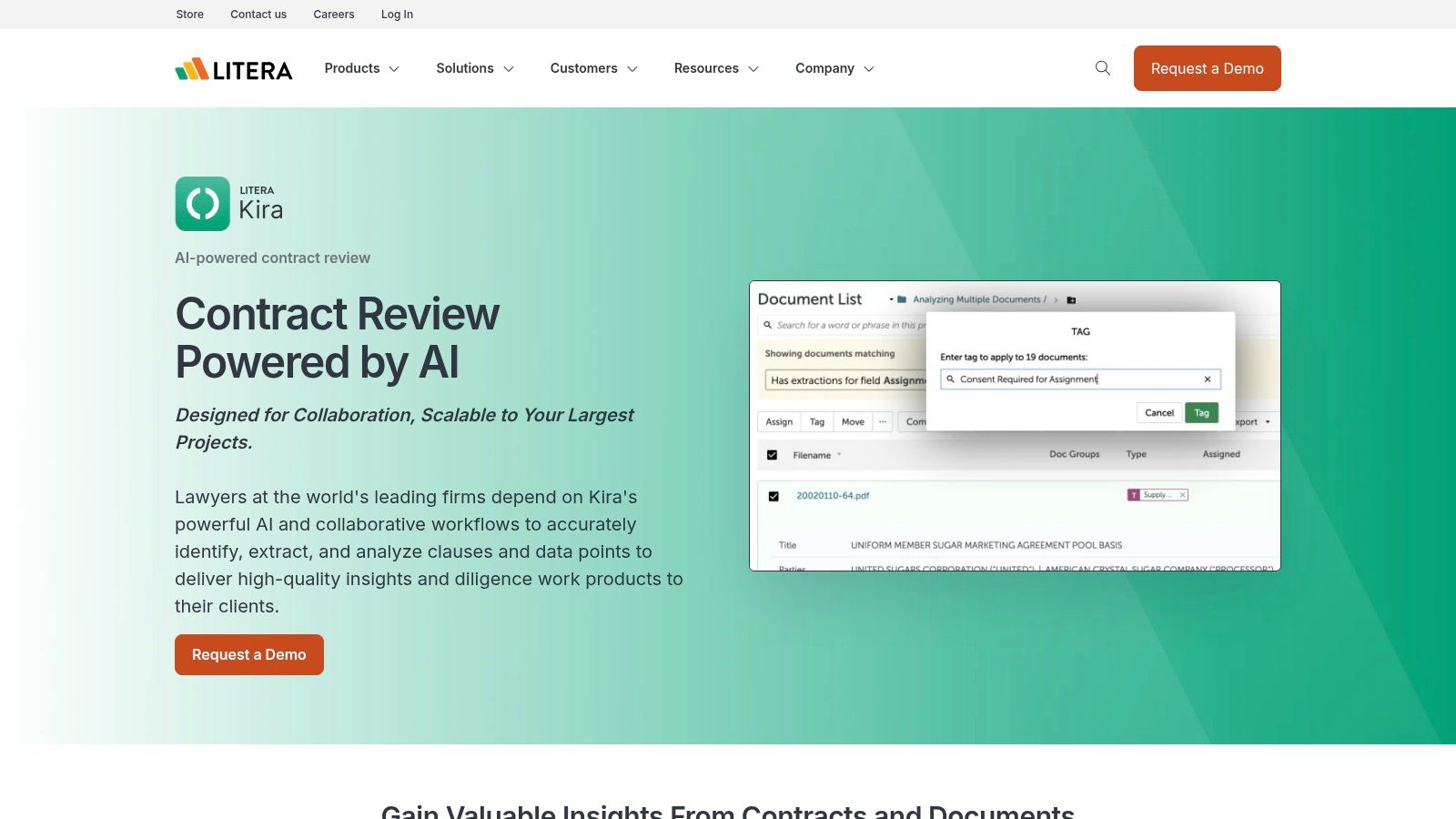
Kira Systems is particularly useful for tasks like due diligence, contract analysis, and regulatory compliance reviews. For example, during a merger or acquisition, Kira can rapidly analyze thousands of contracts, identifying key provisions related to liabilities, termination clauses, and payment schedules. This significantly accelerates the due diligence process, allowing legal teams to focus on higher-level strategic work. Similarly, in-house legal departments can utilize Kira for regulatory compliance, ensuring that contracts adhere to specific legal standards and identifying potential risks. Even individuals managing personal legal agreements, like leases or non-disclosure agreements (NDAs), can benefit from Kira's ability to quickly highlight important clauses and potential issues. For a deeper dive into the applications of this technology, you can learn more about Kira Systems.
Features and Benefits:
- Automated Contract Provision Extraction: Kira automatically identifies and extracts key provisions, eliminating manual review and reducing human error. This feature dramatically accelerates contract analysis, allowing for faster turnaround times and increased efficiency.
- Custom Machine Learning Models: Kira allows users to build custom machine learning models tailored to their specific needs and industry-specific terminology. This flexibility enables the software to adapt to the unique language and clauses prevalent in various legal fields.
- Bulk Document Processing: The platform can process large volumes of documents simultaneously, making it ideal for due diligence and large-scale contract reviews.
- Comparison Across Document Sets: Kira can compare provisions across different document sets, highlighting discrepancies and inconsistencies. This is crucial for identifying potential conflicts and ensuring consistency in legal agreements.
- Integration with Document Management Systems: Seamless integration with existing document management systems streamlines workflows and facilitates data sharing.
Pros:
- High Accuracy: Kira boasts high accuracy in identifying and extracting contractual provisions, minimizing the risk of overlooking critical information.
- Time Savings: It can reduce contract review time by up to 90%, freeing up legal professionals to focus on more strategic tasks.
- Customization: The platform allows customization for industry-specific terminology, ensuring relevance and accuracy in diverse legal contexts.
- Multilingual and Multi-Format Support: Kira handles multiple languages and document formats, expanding its applicability across different jurisdictions and document types.
Cons:
- Investment: A significant investment is required for full implementation, potentially posing a barrier for smaller businesses or individual users. Pricing information isn't publicly available, requiring direct contact with Kira Systems for a quote.
- Training: While user-friendly, Kira requires training for optimal usage and to fully leverage its customization capabilities.
- Volume Dependent Value: The greatest value is realized with large document volumes, making it less cost-effective for those with smaller-scale needs. Technical requirements are not specifically listed but likely involve a stable internet connection and compatibility with modern web browsers.
Kira Systems is a powerful tool that significantly streamlines legal document analysis using AI. While the investment may be substantial, the potential time savings and increased accuracy make it a worthwhile consideration for legal teams seeking to optimize their workflows and improve their contract analysis capabilities. For startups, freelance professionals, and in-house legal teams at larger enterprises dealing with high volumes of contracts, the benefits of Kira Systems can be transformative in managing legal documents efficiently and accurately.
4. LexisNexis Legal Analytics
LexisNexis Legal Analytics stands out as a powerful AI-driven tool specifically designed for legal professionals seeking data-driven insights to bolster their legal strategies. By leveraging artificial intelligence, machine learning, and natural language processing, this platform analyzes vast amounts of legal data, including court opinions, judge rulings, and case outcomes. This deep analysis allows attorneys to develop more effective strategies, predict case outcomes with greater accuracy, and gain a competitive edge in litigation. For those working with legal documents, LexisNexis offers valuable functionalities for understanding precedent, assessing judicial tendencies, and crafting compelling arguments. This makes it a crucial tool for navigating the complexities of the legal landscape, making it highly relevant for anyone working with AI for legal documents.

Specifically, LexisNexis Legal Analytics offers distinct advantages in several key areas. Litigation analytics provides insights into case law, judge behavior, and opposing counsel tactics, helping attorneys develop data-backed strategies. Judicial analytics offers an in-depth understanding of individual judges' rulings, tendencies, and citations, enabling better anticipation of potential outcomes. Expert witness analytics helps identify and vet expert witnesses based on their track record and credibility. This breadth of analytical capabilities makes the platform suitable for a range of users, from small business owners reviewing contracts to large legal teams managing complex litigation.
Features and Benefits:
- Predictive Analytics for Case Outcomes: Forecast potential case results based on historical data, allowing for more informed decision-making and risk assessment. This is particularly useful for in-house legal teams evaluating the potential ROI of litigation.
- Judge and Attorney Performance Analysis: Understand the past performance of judges and opposing counsel, including their win/loss rates and typical rulings. This information is valuable for small business owners and freelance professionals choosing legal representation.
- Motion Success Rate Tracking: Gauge the likelihood of success for specific motions based on historical data, assisting in strategic planning and resource allocation.
- Case Timeline Estimation: Predict the duration of a case based on similar cases, facilitating better project management and budgeting.
- Document Pattern Recognition: Identify recurring themes, clauses, and language patterns within legal documents, streamlining document review for individuals and businesses alike.
Pros:
- Evidence-based Litigation Strategy Development: Move beyond gut feelings and develop strategies grounded in data and precedent.
- Comprehensive Database of Court Decisions and Outcomes: Access a vast repository of legal information to support research and analysis.
- Integration with other LexisNexis Research Tools: Seamlessly integrate with existing LexisNexis subscriptions for enhanced research capabilities.
- Regular Updates with New Case Data: Stay current with the latest legal developments and ensure analyses are based on the most recent information.
Cons:
- Complex Interface May Require Training: The platform's robust functionality can make it initially challenging to navigate, potentially necessitating training for effective use.
- Higher Pricing Tier Compared to Simpler Tools: The comprehensive nature of LexisNexis Legal Analytics comes at a higher cost, which may be prohibitive for some smaller businesses or individuals.
- Analytics Quality Varies by Jurisdiction Coverage: The depth and accuracy of the analytics may vary depending on the level of coverage for specific jurisdictions.
Website: https://www.lexisnexis.com/en-us/products/lexis-analytics.page
While pricing information isn't publicly available, it's generally understood that LexisNexis products are subscription-based and tailored to individual needs. Contacting LexisNexis directly is recommended to discuss specific pricing and technical requirements. Compared to simpler AI tools focused solely on document review, LexisNexis Legal Analytics offers a significantly broader and deeper analytical capability, making it a valuable investment for legal professionals seeking a comprehensive solution. Implementation typically involves working with a LexisNexis representative to configure the platform based on your specific needs and integrate it with existing systems.
5. Luminance: AI-Powered Insight for Legal Documents
Luminance distinguishes itself as a leading AI platform for legal document analysis, leveraging sophisticated pattern recognition and machine learning to provide unparalleled insights. This powerful tool allows legal teams of all sizes to quickly identify anomalies, hidden risks, and unusual clauses within contracts and other legal documents. Its strength lies in its ability to process vast quantities of data simultaneously, highlighting crucial information without requiring extensive pre-programming or complex rule creation. This makes Luminance a valuable asset for due diligence, regulatory compliance reviews, and comprehensive contract management.
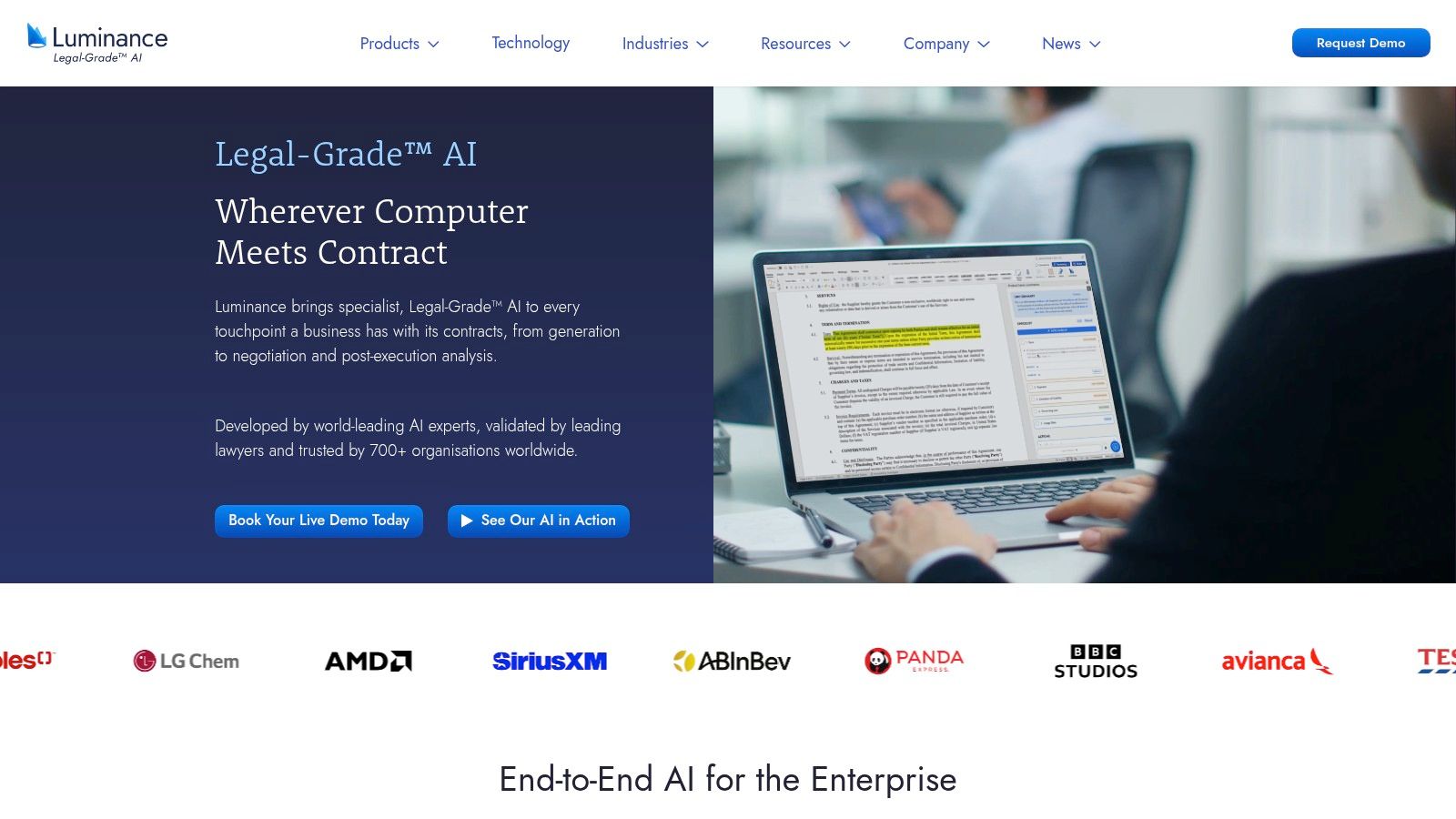
For time-pressed legal professionals, Luminance offers several key advantages. Imagine needing to review hundreds of contracts as part of a merger or acquisition. Manually reviewing each document for discrepancies and potential risks would be an incredibly time-consuming process. Luminance automates this, allowing you to quickly identify key provisions, deviations from standard language, and potential red flags. This speed and efficiency make Luminance particularly attractive for transactional work, where fast and accurate document review is critical.
Specific use cases span a variety of legal needs. Small business owners can use Luminance to understand complex lease agreements or vendor contracts. Freelance professionals and consultants can leverage it for efficient contract review, ensuring their interests are protected. In-house legal teams at larger enterprises benefit from the scalable document management and advanced analytics capabilities. Even individuals managing personal legal agreements, like leases or non-disclosure agreements (NDAs), can gain valuable insights using this AI-powered tool. Startup founders and entrepreneurs can also use Luminance to gain rapid legal insights, empowering them to make informed decisions in a fast-paced environment.
Key Features and Benefits:
- Automatic Anomaly Detection: Luminance automatically identifies unusual clauses and deviations from standard language, significantly reducing review time.
- Language-Agnostic Analysis: With support for over 80 languages, Luminance breaks down language barriers, making it a powerful tool for international business dealings.
- Conceptual Understanding: The platform goes beyond simple keyword searches, understanding the underlying concepts and meaning within legal documents.
- Real-time Collaboration: Luminance facilitates real-time collaboration among team members, enabling seamless document review and analysis.
- Visual Data Presentation: The platform presents data in a clear and visual format, making it easier to identify trends, patterns, and potential issues.
Pros and Cons:
- Pros: Out-of-the-box functionality without extensive training, significant acceleration of due diligence processes, broad language support, and flexible deployment options (cloud or on-premises).
- Cons: A premium pricing model may be a barrier for some users. While highly effective for transactional work, its application in litigation may be more limited. Complex document sets may still require human verification.
Pricing and Technical Requirements:
Luminance utilizes a bespoke pricing model based on individual client needs and usage. Contact them directly for specific pricing details. Technical requirements will vary depending on the chosen deployment option (cloud or on-premises).
Comparison with Similar Tools:
While other AI-powered legal document review tools exist, Luminance differentiates itself through its sophisticated language understanding and its ability to detect subtle anomalies without requiring extensive pre-programming. This makes it a powerful tool for uncovering hidden risks and streamlining complex legal processes.
Implementation and Setup Tips:
While Luminance is designed for ease of use, working with a Luminance representative during the initial setup can ensure a smooth integration and optimal configuration for your specific needs.
Website: https://www.luminance.com/
Luminance's powerful AI-driven capabilities, broad language support, and user-friendly interface make it a valuable addition to any legal toolkit, justifying its place on this list of top AI tools for legal documents. It empowers legal professionals to work smarter, faster, and more effectively, allowing them to focus on strategic decision-making rather than tedious manual review.
6. DocuSign CLM (Contract Lifecycle Management)
DocuSign CLM is more than just a digital signature tool; it's a comprehensive, AI-powered contract lifecycle management (CLM) solution designed to streamline every stage of the agreement process. From initial drafting and negotiation to execution, renewal, and analysis, DocuSign CLM empowers legal teams, businesses, and even individuals to manage contracts more efficiently and effectively. Its AI capabilities are particularly valuable for automating tasks like contract analysis, risk identification, and clause extraction, allowing users to save time and reduce the potential for errors. This makes it a powerful tool for anyone looking to leverage AI for legal documents.
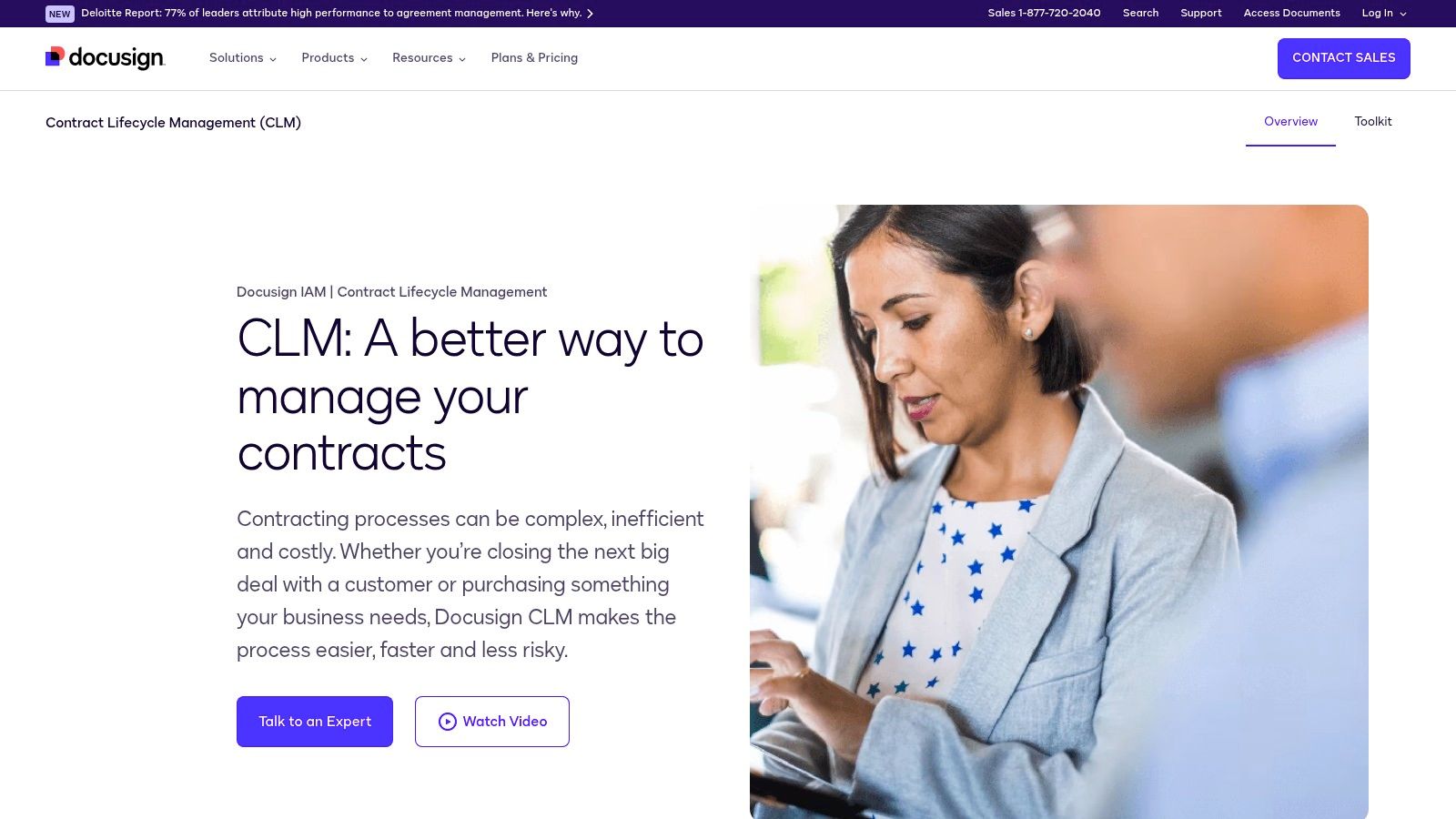
For example, imagine a small business owner needing to review numerous vendor contracts. Manually reviewing each document for key clauses and potential risks would be time-consuming and prone to oversight. DocuSign CLM can automate this process, identifying crucial clauses, highlighting potential risks like unfavorable indemnification terms, and even comparing different versions of a contract to track changes. This allows the business owner to quickly understand the key aspects of each contract and make informed decisions. Similarly, in-house legal teams at larger enterprises can utilize DocuSign CLM to standardize contract templates, automate approvals, and maintain a centralized repository for all agreements, ensuring compliance and simplifying contract management across the organization. Learn more about DocuSign CLM (Contract Lifecycle Management) for a deeper dive into its applications.
Features:
- AI-powered contract analysis and risk identification: Quickly surface critical clauses and assess potential risks.
- Automated clause extraction and comparison: Easily compare different versions of contracts and identify changes.
- Seamless integration with eSignature workflows: Streamline the entire signing process from start to finish.
- Contract template library and generation: Standardize contracts and reduce drafting time.
- Centralized contract repository with advanced search: Easily access and manage all contracts in one secure location.
Pros:
- End-to-end contract management solution: Covers every stage of the contract lifecycle.
- Reduces contract processing time by up to 80%: Significantly improves efficiency.
- Strong security and compliance features: Ensures data integrity and compliance with relevant regulations.
- Integrates with major enterprise systems: Seamlessly connects with existing workflows.
Cons:
- Implementation can be time-consuming: Requires careful planning and configuration.
- Full feature set may be more than small teams need: Smaller businesses may not require all functionalities.
- Subscription pricing can be substantial for comprehensive packages: Costs can be high depending on the chosen plan. While specific pricing isn't publicly available, it's generally based on the number of users and features required. Contact DocuSign directly for a quote.
Website: https://www.docusign.com/products/clm
Implementation Tip: Start with a clearly defined scope of your CLM needs and prioritize the features most critical to your organization. This will help streamline the implementation process and ensure you get the most value from the platform. Consider starting with a pilot program for a specific contract type before rolling out the solution across the entire organization. This allows you to refine your processes and identify any potential challenges before full implementation. DocuSign CLM earns its place on this list due to its robust AI-powered features, comprehensive functionality, and ability to significantly improve contract management efficiency for organizations of all sizes.
7. Casetext CARA A.I.
Casetext CARA A.I. (Case Analysis Research Assistant) is a powerful tool leveraging AI for legal documents, specifically designed to streamline and enhance legal research. For time-strapped legal professionals and even those without formal legal training, CARA offers a more efficient way to analyze briefs, memoranda, and other legal documents, making it a valuable addition to this list. This AI-powered research assistant helps identify relevant case law, ensuring you haven't missed any crucial precedents, and ultimately strengthens your legal arguments. This is particularly beneficial for small business owners, freelance professionals handling contracts, in-house legal teams, and even individuals navigating personal legal agreements.
CARA A.I. distinguishes itself through its intuitive approach. Simply upload your legal document, and CARA takes over. It automatically identifies the key legal issues at play, conducts comprehensive research to find relevant authorities (including those you might have overlooked), and provides valuable contextual analysis. This streamlines the research process, saving significant time and resources. For example, if you're a startup founder reviewing a vendor contract, CARA can help you quickly identify potential legal pitfalls and ensure your interests are protected. Similarly, in-house legal teams at mid-sized enterprises can leverage CARA to scale their document management and analysis processes, improving efficiency and reducing risk. Learn more about Casetext CARA A.I. for further insights into its application in contract review.
Key Features & Benefits:
- Brief Analyzer with Missing Authority Identification: Upload your brief and CARA will analyze it to pinpoint relevant case law you may have missed, strengthening your arguments.
- Parallel Search for Similar Fact Patterns: CARA goes beyond keyword matching, using AI to find cases with similar fact patterns, even if they don't use the same legal terminology.
- Automated Citation Checking and Validation: Ensures the accuracy and validity of your citations, saving time and preventing errors.
- Integration with Document Drafting Workflows: Streamlines the drafting process by directly integrating with your existing workflows.
- Advanced Natural Language Legal Search: Allows you to search using plain English, making it easier to find what you need.
Pros:
- More Affordable: Compared to many competitors, Casetext CARA A.I. offers a more budget-friendly option for accessing powerful AI-driven legal research capabilities.
- Intuitive Interface: Requires minimal training, allowing users to quickly get up and running.
- Uncovers Hidden Gems: Finds cases that other research tools might miss, giving you a competitive edge.
- Continuously Improving Algorithms: Casetext regularly updates CARA's algorithms, ensuring its performance and accuracy continually improve.
Cons:
- Case Coverage: While comprehensive, its case law database might not be as extensive as some larger, more established platforms.
- Focus on Case Law: Primarily focuses on case law research, with less emphasis on regulatory materials.
- Limited International Jurisdiction Coverage: Currently, its coverage of international jurisdictions is limited.
Pricing and Technical Requirements: While specific pricing isn't publicly listed, Casetext offers various subscription plans tailored to different needs. Contact them directly for details. Technically, all you need is an internet connection and a web browser to access CARA A.I.
Comparison with Similar Tools: While tools like Lex Machina and Westlaw Edge also leverage AI for legal research, CARA A.I. distinguishes itself through its affordability and user-friendly interface. This makes it a particularly attractive option for smaller firms, solo practitioners, and individuals looking for a cost-effective solution.
Implementation/Setup Tips: Getting started with CARA A.I. is simple. Visit the Casetext website, sign up for an account, and upload your document. The platform guides you through the rest of the process.
Website: https://casetext.com/cara-ai/
In conclusion, Casetext CARA A.I. earns its place on this list by offering a powerful yet accessible solution for AI-powered legal document analysis. Its combination of advanced features, user-friendly interface, and affordability makes it an invaluable tool for anyone working with legal documents, from seasoned attorneys to small business owners.
8. Everlaw: AI-Powered Litigation Platform for Efficient Document Management
Everlaw stands out as a robust cloud-based litigation platform leveraging AI for legal documents to streamline various processes, including document review, case building, and team collaboration. Its comprehensive suite of AI-powered tools empowers legal teams to efficiently manage discovery, prepare for depositions, develop case strategies, and handle massive document sets with ease. This makes it a powerful solution for AI for legal documents, particularly for larger, complex cases. Everlaw's focus on AI-driven efficiency and collaborative features makes it a valuable asset for legal professionals dealing with the complexities of modern litigation.
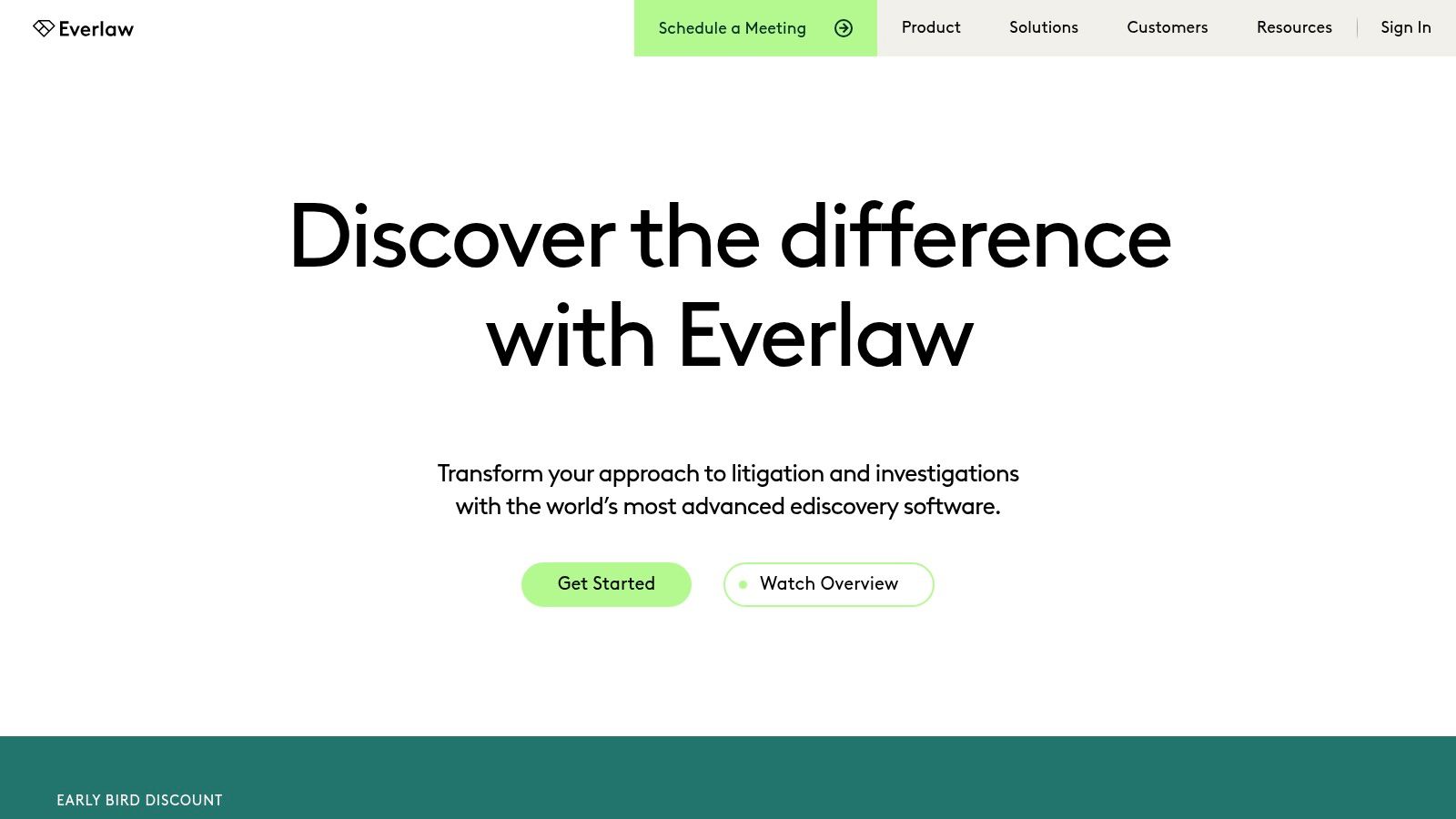
One of Everlaw's key strengths lies in its AI-powered predictive coding for document review. This feature drastically reduces the time and resources required to sift through mountains of documents by identifying relevant information based on patterns and keywords. Automatic transcription of audio/video files further streamlines the process, converting spoken content into searchable text. Visual data analytics and visualization tools enable legal teams to gain deeper insights from their data, identify key trends, and build compelling narratives. The platform also excels in collaborative case building and storytelling, allowing teams to work together seamlessly, share information, and develop cohesive legal strategies. Automated privilege log creation simplifies another time-consuming task, ensuring compliance and reducing the risk of errors.
While pricing information isn't publicly available, Everlaw caters to various user groups, from small businesses to large enterprises. Its intuitive interface makes it accessible even to users without extensive technical expertise, though some advanced features may require additional training. Implementation is generally smooth, with Everlaw providing support and resources to help users get started. While Everlaw is best suited for larger cases with significant document volumes, its comprehensive features and focus on AI for legal documents make it a compelling option for any legal team seeking increased efficiency and collaboration.
Features and Benefits:
- AI-powered predictive coding: Accelerates document review and identifies key evidence quickly.
- Automatic audio/video transcription: Transforms spoken content into searchable text, saving time and effort.
- Visual data analytics: Provides valuable insights and helps identify key trends within large datasets.
- Collaborative case building: Facilitates seamless teamwork and information sharing.
- Automated privilege log creation: Simplifies a complex and time-consuming task.
Pros:
- Intuitive and user-friendly interface.
- Transparent predictive coding process.
- Excellent collaboration features.
- Comprehensive platform covering the entire litigation lifecycle.
Cons:
- Can be more expensive than some specialized tools.
- Some advanced features may require additional training.
- Best suited for larger cases with substantial document volumes.
Comparison with Similar Tools: While other platforms offer some similar features, Everlaw differentiates itself through its comprehensive approach to AI for legal documents, combining powerful document review capabilities with robust collaboration and case management tools within a single platform. This integrated approach streamlines workflows and enhances overall efficiency.
Implementation/Setup Tips:
- Leverage Everlaw's training resources to maximize the platform's potential.
- Start with a pilot project to familiarize yourself with the platform's features.
- Integrate Everlaw with existing systems to streamline workflows.
Website: https://www.everlaw.com/
Top AI Tools for Legal Document Management Comparison
| Application Area | Implementation Complexity 🔄 | Resource Requirements ⚡ | Expected Outcomes 📊 | Ideal Use Cases 💡 | Key Advantages ⭐ |
|---|---|---|---|---|---|
| Legal Document Simplifier | Low - User-friendly, minimal onboarding | Low - Pay-as-you-go or affordable subscriptions | Clear, concise summaries; risk alerts; deadline tracking | Small businesses, freelancers, in-house legal teams | Saves legal review time; affordable & flexible |
| ROSS Intelligence | Medium - Requires some training | Medium - Subscription can be costly for smaller firms | Faster, precise legal research and case law discovery | Legal research and case law analysis | Contextual NLP search; improves with use |
| Kira Systems | High - Needs training, customization | High - Investment for full features, best for large volumes | Automated contract provision extraction; reduces review time | Due diligence, contract analysis, regulatory review | High accuracy; customizable; supports many formats |
| LexisNexis Legal Analytics | High - Complex interface, training needed | High - Premium pricing | Data-driven litigation strategy; predictive case analytics | Litigation strategy and outcome prediction | Comprehensive analytics; large data coverage |
| Luminance | Medium - Works out-of-the-box, some verification recommended | Medium to High - Premium pricing | Anomaly detection; due diligence acceleration | Due diligence, compliance, contract management | Multi-language support; flexible deployment |
| DocuSign CLM | High - Time-consuming implementation | High - Enterprise pricing, integration efforts | End-to-end contract lifecycle automation | Contract management and automation | Streamlines workflows; strong security |
| Casetext CARA A.I. | Low to Medium - Intuitive, minimal training | Low to Medium - More affordable | AI-assisted legal brief analysis; missed authorities found | Legal brief analysis and case law research | Affordable; finds overlooked precedents |
| Everlaw | High - Advanced features require training | High - Best for large cases | Predictive coding; document review; collaboration | Litigation document review and case building | Comprehensive litigation platform; collaborative |
Choosing the Right AI Tool for Your Legal Needs
Selecting the optimal AI for legal documents depends heavily on your specific needs and resources. Whether you’re a small business owner seeking cost-effective legal analysis, a freelance professional reviewing contracts, or part of a large legal team managing complex litigation, the right AI tool can significantly impact your efficiency. Key factors to consider include the volume and complexity of documents you handle, the level of automation you desire, integration capabilities with your existing systems, and of course, budget. We've explored eight leading solutions, from document simplification tools like Legal Document Simplifier to sophisticated platforms like ROSS Intelligence, Kira Systems, LexisNexis Legal Analytics, Luminance, DocuSign CLM, Casetext CARA A.I., and Everlaw, each offering unique strengths for different use cases.
Remember to prioritize tools that align with your specific workflow. For example, if rapid legal insights are crucial for your startup, solutions like Casetext CARA A.I. may be a good fit. If contract lifecycle management is a priority, explore options like DocuSign CLM. For a deeper dive into the nuances of each tool and emerging trends in the field, you may find "Top AI for Legal Documents in 2025 | Boost Your Legal Workflow" from Whisperit a valuable resource. To further explore the top AI tools available for legal professionals in 2025, check out this comprehensive guide: best AI for legal documents. By carefully evaluating your needs and leveraging the power of AI, you can streamline your legal document processes, minimize risks, and free up valuable time to focus on higher-value tasks.
Implementing AI for legal documents is an investment in the future of your legal operations. Embrace these advancements to gain a competitive edge and navigate the complexities of legal documentation with greater confidence and efficiency. Looking for a simplified approach to complex legal documents? Legal Document Simplifier leverages the power of AI to make legal language clearer and more accessible, perfect for anyone seeking a user-friendly solution for understanding and managing legal agreements.